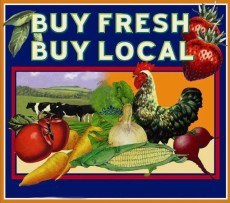Local Choices: Supporting Sustainability
Even when the Farmers Markets are closed, there are many local food options that support community and environment.
-February 3, 2012

I have a friend who posted on Facebook a picture of a chicken foot allegedly found in some take-out Chinese food in a far-flung area of the country. She noted, “This is why I only eat organic!”
First of all, chicken feet are a common snack in China. Secondly, how did
she know it wasn’t an organic chicken?
Her whole attitude bothered me. So many of people see the term “organic” and assume it means better, when in reality that is often not simply the case. Sometimes buying locally produced food can be a more important decision for your family, your community and the environment.
Most of us know that organic foods are a good choice because most pesticides, synthetic hormones, and other potentially hazardous practices are not used, according to the FDA. We don’t want those things in our environment, and we certainly don’t want to feed them to our families.
And yet, organic isn’t always realistic. It can be expensive. But have you also considered that but most of the time the food must be shipped long distances before it reaches your supermarket? According to OurEarth.org, food travels an average of 1,200 miles before it reaches your dinner plate and the implications of that can be immense. Locally produced food saves energy and prevents emissions from going into the air.
Plus it supports your community.
We are lucky these days that as consumers, we have a wide range of choices. Remember when you went to the grocery store and there was one kind of lettuce available? Two if it was a fancy store?
But the range of choices can be overwhelming.
If you’re trying to support local businesses and you are concerned about sustainability, good places to start shopping are your local farmers markets. You can find lists of them at the Maryland Department of Agriculture website.
But what about times like now, during the winter, when the markets are closed?
Think seasonally.
The more “in season” your produce and vegetables are, the more likely they didn’t travel as far. Seek out local sources of meat and dairy – and talk to the folks that run them. They will help point you towards other local sources as well.
There are a number of sources for local food that are open year-round, and many of them also meet organic requirements or are raising their animals naturally and/or Certified Humane®.
Here are some of them. Check out their websites or give them a call before you stop by as hours and days vary, while some only offer delivery:
Against The Wind Ranch, Inc.
24235 Burnt Hill Road, Clarksburg 20871
http://www.againstthewindranch.com
South Mountain Creamery
8305 Bolivar Road, Middletown 21769
http://www.southmountaincreamery.com
For a complete listing please visit the link below:
http://ellicottcity.patch.com/articles/local-choices-supporting-sustainability

ellicottcity.patch.com
Posted: February 3, 2012 by Certified Humane
Local Choices: Supporting Sustainability

Even when the Farmers Markets are closed, there are many local food options that support community and environment.
-February 3, 2012
I have a friend who posted on Facebook a picture of a chicken foot allegedly found in some take-out Chinese food in a far-flung area of the country. She noted, “This is why I only eat organic!”
First of all, chicken feet are a common snack in China. Secondly, how did
she know it wasn’t an organic chicken?
Her whole attitude bothered me. So many of people see the term “organic” and assume it means better, when in reality that is often not simply the case. Sometimes buying locally produced food can be a more important decision for your family, your community and the environment.
Most of us know that organic foods are a good choice because most pesticides, synthetic hormones, and other potentially hazardous practices are not used, according to the FDA. We don’t want those things in our environment, and we certainly don’t want to feed them to our families.
And yet, organic isn’t always realistic. It can be expensive. But have you also considered that but most of the time the food must be shipped long distances before it reaches your supermarket? According to OurEarth.org, food travels an average of 1,200 miles before it reaches your dinner plate and the implications of that can be immense. Locally produced food saves energy and prevents emissions from going into the air.
Plus it supports your community.
We are lucky these days that as consumers, we have a wide range of choices. Remember when you went to the grocery store and there was one kind of lettuce available? Two if it was a fancy store?
But the range of choices can be overwhelming.
If you’re trying to support local businesses and you are concerned about sustainability, good places to start shopping are your local farmers markets. You can find lists of them at the Maryland Department of Agriculture website.
But what about times like now, during the winter, when the markets are closed?
Think seasonally.
The more “in season” your produce and vegetables are, the more likely they didn’t travel as far. Seek out local sources of meat and dairy – and talk to the folks that run them. They will help point you towards other local sources as well.
There are a number of sources for local food that are open year-round, and many of them also meet organic requirements or are raising their animals naturally and/or Certified Humane®.
Here are some of them. Check out their websites or give them a call before you stop by as hours and days vary, while some only offer delivery:
Against The Wind Ranch, Inc.
24235 Burnt Hill Road, Clarksburg 20871
http://www.againstthewindranch.com
South Mountain Creamery
8305 Bolivar Road, Middletown 21769
http://www.southmountaincreamery.com
For a complete listing please visit the link below:
http://ellicottcity.patch.com/articles/local-choices-supporting-sustainability
Category: news